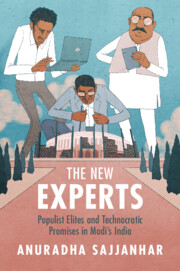3 - Replacing the Custodians of Discourse
Published online by Cambridge University Press: 09 May 2024
Summary
Chapter 3 shows how Prime Minister Modi’s government oscillates between populist anti-elitism and forms of technocratic expertise to produce a distinct form of nationalism that is both seemingly pragmatic and extremely ethnocentric. It starts off by looking at how policy organisations channel dominant policy debates in certain directions, enable particular classifications of target groups, and legitimise certain policy solutions while marginalising others. In opposition to scholarship that sees technocracy and populism as contradictory forces (see Laclau 2005; Rosanvallon 2011), this chapter argues that they have emerged as two complementary arms of governance in contemporary India: (1) populist politics, which appeals to the masses/majority by defining nationalism through rigid boundaries of caste, class, and religion; and (2) technocratic policy, which produces a consensus of pragmatism and neutralises charges of hyper-nationalism. I emphasise the relational dynamic between the two: they function through different, often contradictory, logics and content, yet are able to work towards the same goals in key moments of mutual reinforcement.
- Type
- Chapter
- Information
- The New ExpertsPopulist Elites and Technocratic Promises in Modi's India, pp. 60 - 93Publisher: Cambridge University PressPrint publication year: 2024

